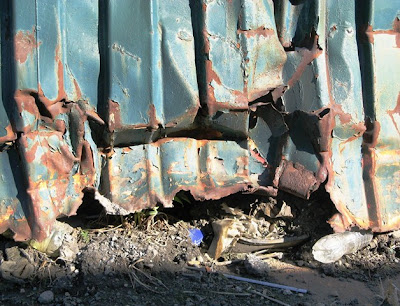










SLIDESHOW – Brooklyn by the Sea (Flickr)
Blog / Novel / Artifacts











SLIDESHOW – Brooklyn by the Sea (Flickr)

 Writing on the wall . . . ?
Writing on the wall . . . ? Home is where the heart is
Home is where the heart is

 Majestic Decay
Majestic Decay
Full Screen: ► . . . 4-way arrows (lower rt.)
Visit Big Sky Brooklyn on Flickr
(Slideshow of the Week Archive)
 Vestiges: A yellow bollard, from the shipyard that once stood at the site, peeks out from the fence
Vestiges: A yellow bollard, from the shipyard that once stood at the site, peeks out from the fence  Former site of Lilly’s Bar
Former site of Lilly’s Bar Before Swedish Modern arrives: Brooklyn Decrepit fills the void
Before Swedish Modern arrives: Brooklyn Decrepit fills the void Foundation Rising: Birth of a Big Box
Foundation Rising: Birth of a Big Box Home is where the art is
Home is where the art is What good are old walls for?
What good are old walls for?
Related Post: Ikea in Red Hook: Globalization Comes to Brooklyn
I need a car . . . “Five minutes”
no matter what
it is always five minutes The car service thrives on door-to-door business. The walk-in passenger is like a stepchild, tolerated but never coddled.
The car service thrives on door-to-door business. The walk-in passenger is like a stepchild, tolerated but never coddled. The moment you take a seat in a car service waiting room, you enter transit limbo—hovering between stasis and mobility.
The moment you take a seat in a car service waiting room, you enter transit limbo—hovering between stasis and mobility. The occasional attempt to enliven the space, by adding plants or pictures, is well-intentioned but wrong. It yields the opposite effect. In this setting art and nature sadly remind you of the world outside, driving home the truism that waiting is the hardest part.
The occasional attempt to enliven the space, by adding plants or pictures, is well-intentioned but wrong. It yields the opposite effect. In this setting art and nature sadly remind you of the world outside, driving home the truism that waiting is the hardest part. If you’re lucky, though, during your time in limbo you might see a few Greek drivers playing backgammon in a way that’s so loud and animated as to change your view of what you had always thought was a tedious game. Or maybe you’ll get to hear the strains of Arab music filtering in from a sleek Town Car parked outside, as the Jewish owner of the car service proudly shows you the Muslim prayer room in the back of the office.
If you’re lucky, though, during your time in limbo you might see a few Greek drivers playing backgammon in a way that’s so loud and animated as to change your view of what you had always thought was a tedious game. Or maybe you’ll get to hear the strains of Arab music filtering in from a sleek Town Car parked outside, as the Jewish owner of the car service proudly shows you the Muslim prayer room in the back of the office. At any rate, it’s never long until your car pulls up and sets you in motion, toward your destination, which if you’re really lucky, is back where you started: home.
At any rate, it’s never long until your car pulls up and sets you in motion, toward your destination, which if you’re really lucky, is back where you started: home.
One of the Most Dangerous Jobs in New York: Gypsy Cab Driver
SLIDESHOW – Castles of Limbo: Car Service Waiting Rooms (Flickr)





 A man came off the footbridge near Calvary Cemetery and was standing next to the Long Island Expressway. Someone there who saw him said he was disoriented. Cars were flying by and the noise was deafening. He kept muttering something about “Triangle Fifty Four” and going to see his cousin, who lived near there.
A man came off the footbridge near Calvary Cemetery and was standing next to the Long Island Expressway. Someone there who saw him said he was disoriented. Cars were flying by and the noise was deafening. He kept muttering something about “Triangle Fifty Four” and going to see his cousin, who lived near there.



 He had been discharged from a mental hospital the day before and was going to talk to his cousin about staying with him temporarily.
He had been discharged from a mental hospital the day before and was going to talk to his cousin about staying with him temporarily. His cousin said he never showed up. His wallet was found on a grassy knoll beside the highway.
His cousin said he never showed up. His wallet was found on a grassy knoll beside the highway.
The images and text on this site are Copyright 2007 by Adam Eisenstat. All rights reserved.